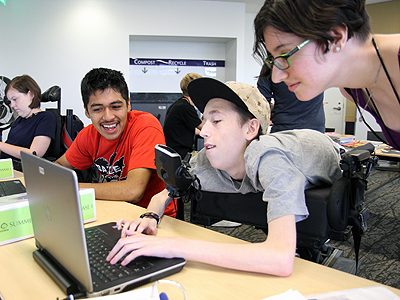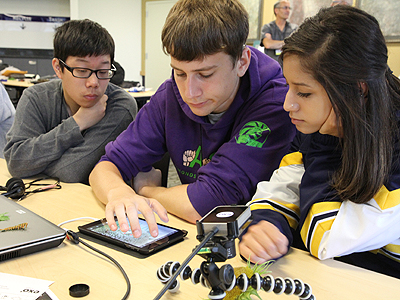Exploring Microsoft

All of our field trips were cool, but this one really stood out. Microsoft’s presentation focused on audio, motion, and video technology, and they had a panel featuring employees with disabilities. With the Xbox Kinect and the Microsoft Phone, we had a glimpse into a future of interactivity that could change the world. With the disability panel, we got the idea that you can do anything you want regardless of what struggles you may face.
The Xbox Kinect is an add-on with the Xbox One, which tracks your motion and voice within a room. It can detect your hand, arm, and leg movements with surprisingly good accuracy. Using this technology, professional trainers can prescribe exercises using apps. The apps can tell you when you’re doing something right or wrong and measure accuracy. The results of your exercises can be sent to your trainer.
The camera shows a large amount of detail and has many different modes. One mode allows the image to be unaffected by light. There is also infrared mode, which shows body heat. The camera is commonly set up for game live streams, so the audience can see the players’ expressions.
Another interesting piece of technology is the Microsoft phone. A highlight is its voice commands. If you want it to tell you a joke, it will respond. If you ask it how the weather is in Seattle and then say “What about Hawaii?” it will recognize that you are still asking about the weather. Of course, it can still do the same things everyday phones can. If you don’t want to use voice commands, you can still do all the actions with your hands.

The panel included Microsoft employees with disabilities. One of the people on the panel was a quadriplegic, two of them had severely impaired vision, and one was deaf. They shared challenges they had to overcome, and that even though they have disabilities, they still lived their lives to the fullest and are successful employees at Microsoft.
We liked how we were able to learn about different things at Microsoft and that we could learn about it with people who know what it is like to have a disability. They helped us understand how we can do anything someone without a disability can do.
Going to Microsoft helped all of us learn that we can get jobs after college and get internships while in college. It built our confidence in what we can do after high school.